Related Research Articles

The East Midlands is one of nine official regions of England. It comprises the eastern half of the area traditionally known as the Midlands. It consists of Derbyshire, Leicestershire, Lincolnshire, Northamptonshire, Nottinghamshire, and Rutland. The region has a land area of 15,624 km2 (6,032 sq mi), with an estimated population 4,934,939 in 2022. With a sufficiency-level world city ranking, Nottingham is the only settlement in the region to be classified by the Globalization and World Cities Research Network.

Nottinghamshire is a ceremonial county in the East Midlands of England. The county borders South Yorkshire to the north-west, Lincolnshire to the east, Leicestershire to the south, and Derbyshire to the west. The largest settlement is the city of Nottingham (323,632), which is also the county town.

The Midlands is the central part of England, bordered by Wales, Northern England, Southern England and the North Sea. The Midlands correspond broadly to the early-medieval kingdom of Mercia, and later became important in the Industrial Revolution of the 18th and 19th centuries. They are now split into two official regions, the West Midlands and East Midlands. The Midlands' biggest city, Birmingham, is the second-largest in the United Kingdom. Other important cities include Coventry, Derby, Leicester, Lincoln, Nottingham, Stoke-on-Trent, Wolverhampton, and Worcester.
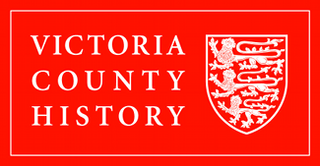
The Victoria History of the Counties of England, commonly known as the Victoria County History or the VCH, is an English history project which began in 1899 with the aim of creating an encyclopaedic history of each of the historic counties of England, and was dedicated to Queen Victoria. In 2012 the project was rededicated to Queen Elizabeth II in celebration of her Diamond Jubilee year. Since 1933 the project has been coordinated by the Institute of Historical Research in the University of London.

Nottinghamshire is a county that is situated in the East Midlands of England. The county has history within the Palaeolithic period, dating anywhere between 500,000 and 10,000 BCE, as well as early Anglo-Saxon communities, dating to 600 CE. Furthermore, the county has significance in the political aspects of English history, particularly within intercommunal fighting, and its economics is historically centred around coal and textiles.
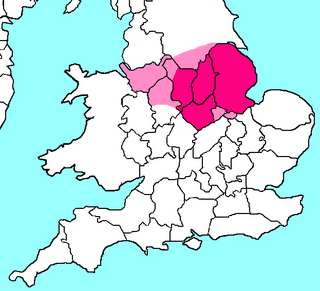
The North Midlands is a loosely defined area covering the northern parts of the Midlands in England. It is not one of the ITL regions like the East Midlands or the West Midlands.

Southwell is a minster and market town, and a civil parish, in the district of Newark and Sherwood in Nottinghamshire, England. It is home to the grade-I listed Southwell Minster, the cathedral of the Anglican Diocese of Southwell and Nottingham. The population of the town was recorded at 7,491 in the 2021 census.
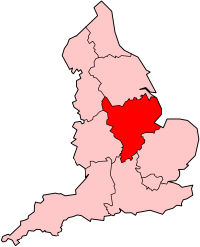
East Midlands English is a dialect, including local and social variations spoken in most parts of East Midlands England. It generally includes areas east of Watling Street, north of an isogloss separating it from variants of Southern English and East Anglian English, and south of another separating it from Northern English dialects. This includes the counties of Derbyshire, Leicestershire, Lincolnshire, Nottinghamshire, Rutland and Northamptonshire. Dialects of northern Derbyshire, Nottinghamshire and Lincolnshire usually share similarities with Northern English dialects. Relative to other English dialects, there have been relatively few studies of East Midlands English.
Michael Christopher Emlyn Jones is a British historian.
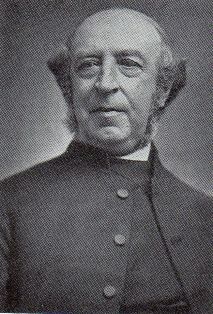
Edward Trollope was an antiquary and an Anglican Bishop of Nottingham in the Victorian era.
Rack-rent denotes two different concepts:
- an excessive rent.
- the full rent of a property, including both land and improvements as if it were subject to an immediate open-market rental review.

Thomas Chambers Hine was an architect based in Nottingham.
Irene Joan Thirsk, was a British economic and social historian, specialising in the history of agriculture. She was the leading British early modern agrarian historian of her era, as well as an important social and economic historian. Her work highlighted the regional differences in agricultural practices in England. She also had an interest in food history and local English history, in particular of Hadlow, Kent.
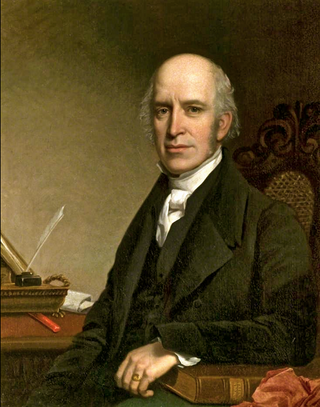
Edward James Willson was an English architect, antiquary, architectural writer, and mayor of Lincoln in 1851–2.
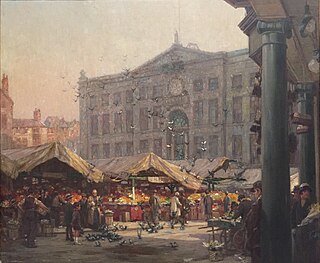
Nottingham Exchange was built in the Market Place in Nottingham between 1724 and 1726 as the main offices of the Nottingham Corporation.

II Anti-Aircraft Corps was a high-level formation of Britain's Anti-Aircraft Command from 1940 to 1942. It defended the Midlands and North West of England and Wales during the Blitz and the middle years of the Second World War.
The Nottinghamshire, Lincolnshire & Derbyshire Rugby Football Union is a governing body for rugby union in part of The Midlands, England. The union is the constituent body of the Rugby Football Union for the counties of Nottinghamshire and Lincolnshire and Derbyshire, with each county also having its own sub-unions with additional club cup competitions. As well as overseeing club rugby, the Notts, Lincs and Derbyshire RFU also administers the county representative teams.
Jane C. Whittle, FRHistS, is a British agricultural historian, who has been Professor of Economic and Social History at the University of Exeter since 2012.
Jonathan David Chambers was a British historian.
References
- 1 2 "Beckett, Prof. John Vincent", Who's Who (online edition, Oxford University Press, December 2017). Retrieved 8 May 2018.
- ↑ "Landownership in Cumbria c.1680-c.1750", EthOS (British Library). Retrieved 8 May 2018.
- 1 2 "John Beckett". University of Nottingham. Retrieved 8 May 2018.
- ↑ "Fellows Directory - Society of Antiquaries". Sal.org.uk. Retrieved 1 December 2017.
- ↑ "Fellows – B" Archived 7 May 2018 at the Wayback Machine , Royal Historical Society. Retrieved 8 May 2018.